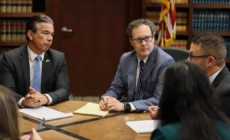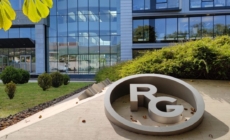-
My bathroom scale and book sales are rigged. Expect lawsuits, layoffs - 20 mins ago
-
Monterrey vs. Charlotte: Leagues Cup preview, odds, how to watch, time - 26 mins ago
-
Ukraine Rejects Conscription Death Investigation, Foreign Minister Claims - 37 mins ago
-
Dog ‘Doesn’t Understand’ After Being Returned to Shelter for Saddest Reason - 41 mins ago
-
‘Deadliest Catch’ Captain Sig Hansen admits to making dangerous decisions at sea - 49 mins ago
-
L.A. County unlikely to fight probation takeover — as long as receiver battles problem staffers - 59 mins ago
-
Guardians vs. Mets Highlights | MLB on FOX - about 1 hour ago
-
Pharma Powerhouse Gedeon Richter Stays on Track for 2025 Growth - about 1 hour ago
-
$5900 Unitree R1 robot is surprisingly affordable - about 1 hour ago
-
Delta Passenger Asleep on Flight, Anger at What Woman Does on Next Seat - about 1 hour ago
Amazon’s ‘Project Blue’ Rejected Amid Water Fears
The Tucson City Council in Arizona has unanimously voted to reject Amazon’s Project Blue data center.
At a meeting on Wednesday, council members voted 7-0 to block the project, citing strong public opposition and concerns about the high water use.
Newsweek has contacted the council and Amazon for comment via emails sent outside regular business hours.
Why It Matters
Project Blue was billed as an investment that could generate $250 million in tax revenue and create 3,000 temporary construction jobs and up to 180 permanent jobs, according to the Tucson Sentinel, which cited the developers. But critics argued the environmental costs far outweighed the benefits.
Demand for data centers has surged with the rise of cloud computing and artificial intelligence. While advocates say they generate strong tax revenue for local governments and require a huge number of construction jobs to build, critics say the centers themselves employ relatively few people. And some communities have pushed back over concerns about the environmental and social impact.
Nathan Howard/Getty Images
What To Know
Government officials and representatives of developers had refused to confirm Amazon was behind Project Blue, citing the requirements of nondisclosure agreements.
But Councilmember Rocque Perez mentioned Amazon by name during Wednesday’s meeting, the Sentinel reported.
Pima County supervisors had approved the sale of 290 acres of land for the project, according to local station KGUN 9.
But it needed approval to annex the site into city limits so that it could procure the huge amounts of water needed to cool the center’s operations each day.
The first two sites combined would have required almost 2,000 acre-feet of water each year, making them Tucson Water’s biggest customer, the Sentinel reported.
City officials said the project would become “net water positive” because developers would invest in projects to secure new water resources offset their water use.
The project would use drinkable water for the first two years before switching to reclaimed water once a developer-funded pipeline is built.
The project faced criticism at three public meetings in recent weeks, including two in-person meetings that attracted up to 1,000 residents. Many cited the high water use, saying data centers should not be built in Tucson’s desert environment.
What People Are Saying
Ward 1 Councilmember Lane Santa Cruz said, per KGUN 9: “Construction jobs might come, but they’ll leave as fast as they arrive. And the reality is, data centers require very few long term workers. This won’t bring good, paying jobs, dignified jobs, the people actually need in this community. So let’s talk about the basics, water and energy. Headline after headline, city after city, we’ve seen how these facilities drain power and water.”
Ward 4 Councilmember Nikki Lee said during Wednesday’s meeting: “Project Blue represents a lot of things to a lot of people right now, more than just the data center and the project itself. It’s a distrust in government. It’s a distrust in corporations. It’s a very large distrust in tech companies, a distrust in technology and privacy in general, and a fear of artificial intelligence and how fast things are moving and how little control we have.”
The No Desert Data Center Coalition, which opposed Project Blue, said in a statement: “The rejection of Project Blue by Tucson City Council is a huge victory for our desert community and would not have happened without thousands of Tucsonans coming out to vehemently oppose it. We thank the Mayor and Council for standing strong and not folding to Beale’s intimidation tactics and greenwashing propaganda. Tucson made the right decision to halt Amazon’s harmful data center in its tracks and protect our water, air and a liveable climate. We will remain vigilant because we know big corporations like Amazon, Beale and TEP have a hard time taking no for an answer and we are committed to stopping any data center they try to force on us within our watershed.”
What’s Next
The vote ordered city staff to stop working with the project’s developers. The city council also voted for the city continue to develop regulations for future data center proposals.
Source link































